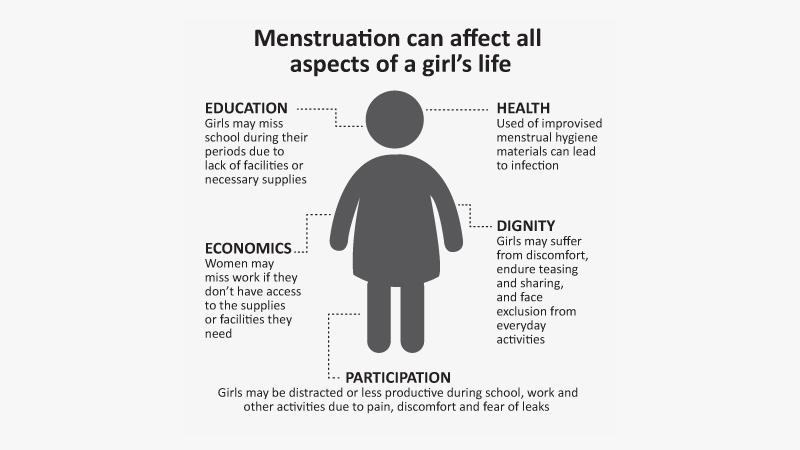
Sri Lanka Water Partnership (SLWP) and Network of Women Water Professionals (NetWwater) - a partner of Global Water Partnership, have been working on school water and sanitation programs through ‘Sisu Jala Hamuwa’ for more than fifteen years. Advocating that sustainable sanitation goes beyond mere provision of facilities they have called for a change in sanitation culture where hygiene awareness, maintenance and regular cleansing systems are put in place along with provision of new or upgraded facilities.
Rehabilitation of school sanitation in selected sites in the Central Province was carried out following a province-wide study of school sanitation. These studies and subsequent evidence based advocacy activities highlighted the need for a focused menstrual hygiene management program. Poor menstrual hygiene management (MHM) practices and incorrect pad disposal were seen as major causes for blockages and failures in school sanitation systems for girl children during menstruation.
Access to education for girls is closely linked with access to sanitation and menstrual hygiene.There is a need for more girl friendly school toilets with changing facilities, water supply for cleansing and pad disposal systems. Girls with no access to school sanitation tend to stay at home during menstruation, losing as much as four school days per month. An MHM program was needed to reduce absenteeism during menstruation among adolescent girls and to improve their reproductive health awareness.
With initial support of the National Development Bank PLC (NDB) and the strong support of the Central Province education authorities, SLWP/NetWwater commenced a MHM program in 2014 in Denuwara Education Zone with the dual objective of improving school girls’ health and their access to education. Using the MHM wheel developed by Geneva-based Water Supply and Sanitation Collaborative Council (WSSCC) as a prototype; student counselors, teachers and school prefects were taught to make it for dissemination to schools.
Provincial Resource persons also attended a Regional TOT conducted by WSSCC and the Ministry of City Planning and Water Supply in Sri Lanka. A MHM brochure in the national language by SLWP was distributed to the participants as part of the activity. Followup pilot activities were carried out in the Denuwara schools, the Digane Teacher Training College and in selected girls schools in areas outside Denuwara Zone - Katugastota, Gampola, Galagedera and Matale. This activity was supported by the YWCA, the oldest women’s organisation in Sri Lanka.
 The supportive stance of the Education Ministry, Central Province was crucial to the successful continuation of MHM at school level.
The supportive stance of the Education Ministry, Central Province was crucial to the successful continuation of MHM at school level.
At an MHM program carried out in Matale (attended by 23 teachers and 423 girls (many premenstrual), with support of the Provincial Department of Education and Regional Department of Health Services, Central Province in July 2019, the students were given an opportunity to send written questions after each session and responses were given by the resource persons. Issues raised by students included involuntary urination, use of pain killers during menstruation, selection of pads, infections due to prolonged use of pads, frequency of pad changes, type of pad, dealing with excessively heavy periods, maintaining cleanliness during menstruation, food types to be avoided during menstruation, reasons for irregular menstruation, connection between irregular menstruation and future possible loss of fertility. A number of issues were related to traditional norms, rituals and food practices connected with the onset of menarche. It is important to break the culture of silence related to MHM and teaching of reproductive health.
It must be a normal part of the school health program. Many of the queries raised by the Matale schoolgirls could be dealt through a systematic reproductive health education program within the school system by trained teachers or student counsellors.
The current culture of silence regarding the teaching of reproductive health has led to the MHM issue being long sidelined by most school authorities. Due to prevailing conservative norms, the lessons on reproductive health is rarely taught in detail in class, especially in mixed schools. Even in girls only schools, there is a tendency to gloss over the detailed functioning of the reproductive system.
Why is it important to open up a discourse on the hitherto hidden Cinderella issue, menstruation? One compelling reason is the need to improve access to education by increasing the school attendance rate of girl children. But there are other factors as well. Cervical cancer is the second most frequent cancer identified in women in Sri Lanka. The same hide bound conservatism which impedes open discussion of menstruation and related issues in youth can also be the reason for frequent incidences of delayed treatment of cervical cancer as many older patients fight shy of seeking medical assistance in time. Of late following the comments related to MHM made by a leading political personage has garnered myriad responses.
MHM has become a talking point at all levels for people from all walks of life; sometimes it has been limited to politically related assertions, jokes and jibes but often there has been a real attempt at understanding the issues.
It is hoped that the issue and the discourse will survive the Presidential campaign and become a real platform for action . MHM sensitization is not an issue limited to the 52% of women and girls alone, but a national issue impacting on how we plan to reach the SDGs.
